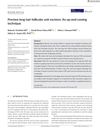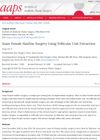 26 citations,
October 2021 in “Current Dermatology Reports”
26 citations,
October 2021 in “Current Dermatology Reports” Social media is increasingly used in dermatology for education and networking but has risks like misinformation and privacy issues.
 18 citations,
June 2019 in “Clinical research in dermatology”
18 citations,
June 2019 in “Clinical research in dermatology” Acne can't be cured but can be managed with treatments like benzoyl peroxide and diet changes; it's costly and can lead to scarring and mental health issues.
 1 citations,
March 2023 in “Nutrients”
1 citations,
March 2023 in “Nutrients” The conclusion is that obesity should be managed with a slow, balanced approach to diet and exercise, with medication and surgery as additional options, and education and access to care are important.
 2 citations,
June 2023 in “Journal of the American Academy of Dermatology”
2 citations,
June 2023 in “Journal of the American Academy of Dermatology” Hair, skin, and nails supplement use nearly doubled from 2011 to 2020, with higher usage among young adults, females, and certain ethnic groups.
 27 citations,
March 2013 in “Social Semiotics”
27 citations,
March 2013 in “Social Semiotics” Commercial hair loss websites promote Propecia by making men feel insecure about baldness and suggesting it's a medical issue needing treatment.
 July 2023 in “Journal of Cosmetic Dermatology”
July 2023 in “Journal of Cosmetic Dermatology” Practitioners treating hair loss need better education and resources to overcome challenges like commercial bias and ethical dilemmas.
 3 citations,
February 2021 in “Journal of Cosmetic Dermatology”
3 citations,
February 2021 in “Journal of Cosmetic Dermatology” Long hair FUE, a hair transplant without shaving, is becoming more popular and surgeons should learn it.
 37 citations,
August 2013 in “Facial Plastic Surgery Clinics of North America”
37 citations,
August 2013 in “Facial Plastic Surgery Clinics of North America” Facial hair restoration is generally successful and satisfying for patients when done with quality techniques and realistic expectations.
 1 citations,
January 2014 in “Archives of Aesthetic Plastic Surgery”
1 citations,
January 2014 in “Archives of Aesthetic Plastic Surgery” The FUE technique is effective for Asian female hairline restoration with benefits like no scar and short recovery time.
 17 citations,
January 2007 in “Popular Communication”
17 citations,
January 2007 in “Popular Communication” Makeover TV shows promote unrealistic beauty standards and suggest women's worth is based on looks.
 July 2021 in “European Journal of Plastic Surgery”
July 2021 in “European Journal of Plastic Surgery” Modern society values both traditional beauty and imperfections, but media pressures lead to more cosmetic enhancements and ethical concerns.











